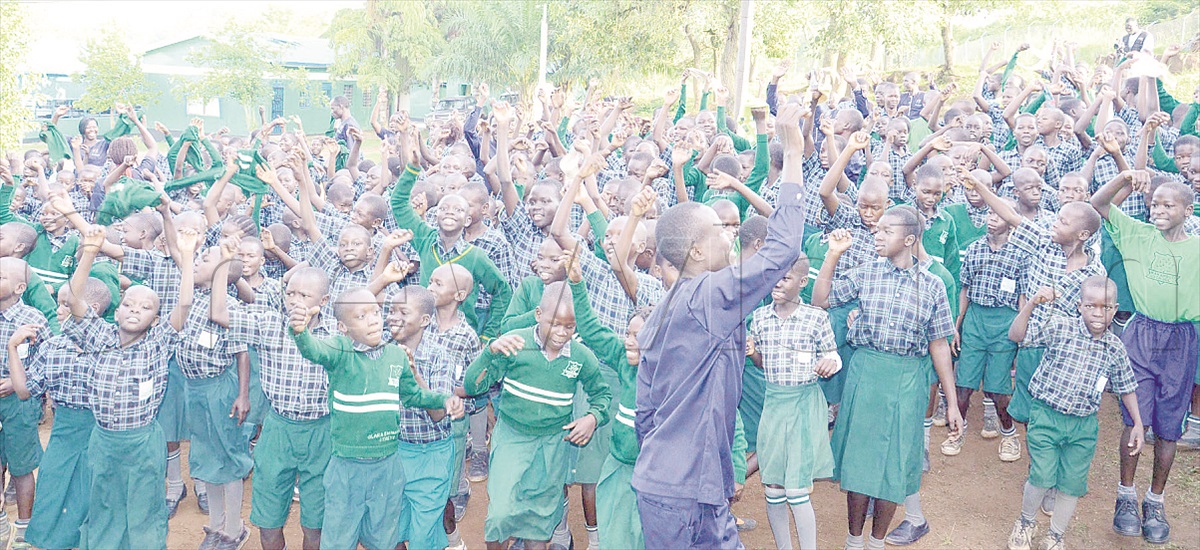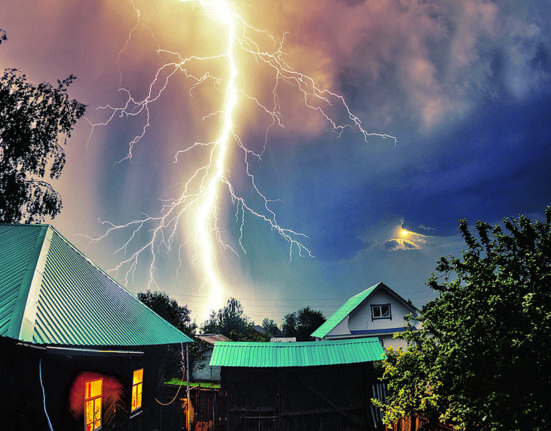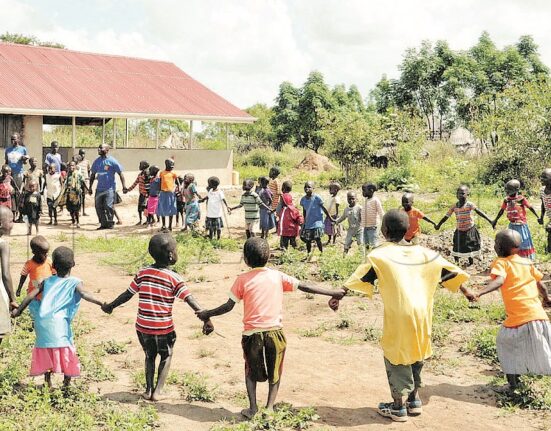(This article was first published in the New Vision on July 6, 2022)
By Arnest Tumwesige
When a girl and a boy stepped forward after the recorded anthems were played during the assembly, a first-time visitor to Project Shelter Wakadogo would have probably thought the two pupils were going to address the school.
But, as the two stood in front of their peers, a song blared from a loudspeaker. They broke into a dance and then later, one by one, the other pupils joined in the dance. A few seconds later, everyone, including teachers, was dancing.
The Award
At Project Shelter Wakadogo, a nursery and primary school in Pece Acoyo, Gulu City, it is the norm for pupils and teachers to dance to local and international secular and gospel music during the school assembly before listening to speeches everyday.
They dance for nearly 30 minutes, with a different pair of pupils stepping forward to lead others in dancing to one song at a time.
Normally, no dancing takes place after the school headteacher has spoken and dissolved the assembly. However, a recent assembly was different.
Charles Odong, the headteacher, after announcing to the assembly that the school had been shortlisted for a global award, allowed the pupils and teachers to continue dancing after his speech to celebrate the news.
The school was shortlisted for the World’s Best School prizes under the overcoming adversity category. The prizes celebrate the schools’ leading and innovative practices that have impacted learners and their communities. One of the school’s innovative practices is dancing before classes.
“We begin our assemblies with music to help pupils and teachers forget about their frustrations, in case of any,” Odong told Mwalimu.
Alongside this innovative practice, this prize category targets schools that build the character of the learners and their community to achieve resilience against conflict, climate-related disasters, poverty or pandemics.
SH187M Award
In this award category, the school is competing with Amani School for Refugees (Kenya), Best Intellectuals Model School (Nigeria), Escola Evandro Ferreira Dos Santos (Brazil) and Marcus Garvey Technical High School (Jamaica).
Pinelands North Primary School (South Africa), Samaritan Mission School (India), SMK Kampong Jawa (Malaysia), St Edward’s Primary School (Australia) and West End Primary (South Africa). Other 40 schools have been shortlisted under four different categories.
If the school emerges the winner in this category in November, it will receive a cash prize of $50,000 (sh187m). The award scheme was established by T4 Education — a UK-based international NGO.
Project Shelter Wakadogo was established in 2009 in the aftermath of a two-decade civil war, which claimed scores of lives and displaced over a million people in northern Uganda.
The school, which is run by a charity registered in Uganda, the UK and Canada, now has an enrollment of over 450 learners, according to Odong. The school, which sits on 10 acres, has 20 teachers and 10 non-teaching staff.

Homeschooling Programme
During the COVID-19 lockdown, the school developed a home[1]schooling programme which allowed it to distribute its learning kits and study materials provided by the Government.
Odong said their teachers, who helped all learners regardless of the schools they attended, had conducted 36,000 door-to-door sessions by the time the lockdown was lifted.
“The programme created hope among the pupils. Apart from teaching, our teachers counselled the children, especially girls,” Odong said, adding: “We came as a solution to the problems created by the war, but some parents have described COVID-19 as having been worse than the war because schools remained open during the war.”
Abigail Faith Lamaro, a Primary Two pupil at a different school, who benefited from this intervention, said she received three lessons per week.
Her mother, Grace Ajok Oola, said: “My daughter was kept engaged with homework and this gave us hope that schools would reopen.”
Online Learning Platform
Odongo said if the school wins the award, they plan to set up an online learning platform, which would be activated should schools ever close again. He explained that part of the money would also be used to provide more scholarships to underprivileged children.
“Our greatest desire is to see more children acquire quality education,” Odongo said.
He added that the school, which receives support from donors in the UK, Dubai and other parts of the world, charges sh120,000 per pupil each term.
The school had its first cohort of Primary Leaving Examination (PLE) candidates in 2016 and is one of the best performing schools in the area. It was the third-best school in PLE in the district in 2019, according to the district rankings.
John Bosco Lakony, a parent, said the school has brought hope in the community. He attributed its growth to its teachers’ commitment to teaching.
James Apire, the chairperson of the school’s Parents Teachers Association, said the home-schooling programme reached the five cells within Pece Acoyo in Gulu City.
“They would teach one topic across the villages at a time to ensure learning was systemic. We bought face masks and sanitisers and sought permission from the authorities,” he added.
Apire said the school also provided parents with maize flour and beans during the lockdown.

Co-Curricular Activities
In terms of co-curricular, the school actively participates in athletics and music and drama competitions. In 2019, it won the music and dance competitions at Torchi county level.
Since the school does not have enough computers for teaching, Odong said they have requested the Uganda Communications Commission to support it with ICT tools as it is offers education to the underprivileged.
What Others Say
Daniel Opio Comboni, Pupil:
The school is seriously focusing on e-learning, which is not the case with other schools. In addition, it takes the issue of education of girls seriously.
Judith Alanyo, Teacher:
During the lockdown, we provided girls with sanitary pads and other support they needed to study. Our door-to-door visits also helped the learners to remain focused.
Martha Kukunda, Pupil:
It takes a whole village to raise a child. I have seen this here, the whole community is responsive to issues regarding education. The school is also promoting quality and that is why we are few pupils.









Leave feedback about this